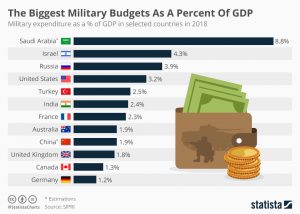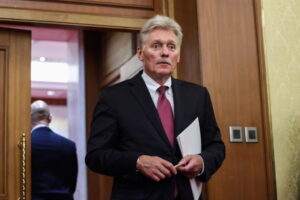In 2018, total global military expenditure rose 2.6 percent to $1.8 trillion, according to new data from the Stockholm International Peace Research Institute (SIPRI). It has reached its highest level since 1988 as well as being 76 percent higher than the post-cold war low of 1998. U.S. military spending grew for the first time in seven years, climbing to $649 billion due to new procurement projects from the Trump administration. No other country comes close to matching U.S. spending and it is nearly as much as the next eight-largest spending countries combined.
Despite increasing its defense budget for the 24th year in succession, China came a distant second for military spending last year with an estimated $250 billion – nearly ten times as much as it spent in 1994. Saudi Arabia came third for military spending ($68 billion), followed by India ($67 billion) and France ($64 billion). When it comes to military budgets as a share of GDP, however, the situation is very different indeed.
Despite a $4.6 billion decrease in spending last year, the military still accounted for 8.8 percent of Saudi Arabia’s GDP in 2018, the highest share of any country in SIPRI’s analysis. By contrast, the $649 billion spent by Washington “only” accounted for 3.2 percent of U.S. GDP. Elsewhere, Russia’s increases in spending on its armed forces pushed its share to 3.9 percent while Germany’s was just 1.2 percent. President Trump has consistently criticized Germany’s low level of expenditure, given that NATO calls on its members to dedicate 2 percent of their GDP on defense. So far, only six European governments are above that threshold.
source: statista

Ask me anything
Explore related questions





